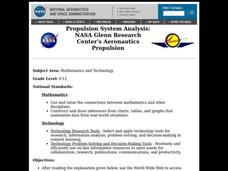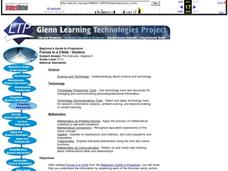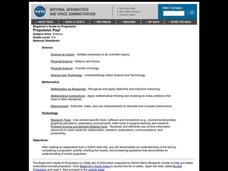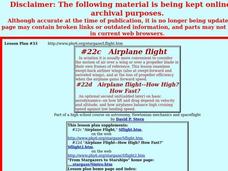Curated OER
Turbojet Thrust
Students, after reading the Web page Turbojet Thrust and completing the activity, explain how jet engines use air to produce thrust. The educational software ""FoilSim" is used in this instructional activity to help students calculate...
Curated OER
Weightlessness
Students use a coffee cup to demonstrate weightlessness. After a lecture/demo, students read an article on free-fall. They perform a simple experiment which helps them explain the concept of weightlessness.
Curated OER
Now You See It, Now You Don't
Pupils determine their eye's blind spot. In this biology lesson, students explain what causes this visual deficiency. They give real life applications of this concept.
Curated OER
The Sky and the Dichotomous Key
Young scholars use a dichotomous key to distinguish between different types of clouds
Curated OER
Fronts
Fourth graders define cold and warm fronts, explain how they are formed and they ways that they affect the weather.
Curated OER
Thunderstorms
Fourth graders investigate the attraction between two different charges to explain the concept of lightning in a thunderstorm.
Curated OER
Dew Point
Fourth graders investigate saturation conditions and measure the dew point. They conduct an experiment, record data on a worksheet, and measure the dew point in the experiment.
Curated OER
Weather Predictions
Students play the role of weather personalities by making five day forecasts based on data gathered from observations, weather instruments, and weather maps. Each day a small group makes a class forecast for the next day and reviews the...
Curated OER
Cold Fronts And Warm Fronts
Learners simulate the movement of cold and warm fronts as they listen to a story about the weather and Mr. Sun. They brainstorm the characteristics of each type of front then write about which front they would prefer if they were a...
Curated OER
Model Rockets
Students study the basics of a model rocket and its classifications. In this rocket instructional activity students determine the flight duration of a model rocket.
Curated OER
Aeronautics Propulsion
Students use the World Wide Web to access additional information needed to complete the activities on the forces on an airplane, the function of the stabilizer, and the calculation of Mach speed, temperature, pressure, and thrust.
Curated OER
Mach Number Problem Set
Students read a textbook about aerodynamics. They find out the definition of Mach number. They complete problems designed to demonstrate their ability to solve Mach number equations.
Curated OER
Forces in a Climb - Vectors
Students read Forces in a Climb from the Beginner's Guide to Propulsion, and explain each of the formulas using vectors.
Curated OER
Using 3-D Models for Code Validation with FoilSim
Students use FoilSim to complete the activity to create tables of data sets comparing the lift values for a 3-D model of a symmetrical wing section to the values predicted by the FoilSim software.
Curated OER
Why Invent That?
Learners demonstrate an understanding of the text by completing an activity on the advantages and disadvantages of inventing and using a human-powered airplane.
Curated OER
Equation of State Problem Set
Students demonstrate their understanding of the equation of state by computing the gas constant from air properties. They use online research tools and apply integrated math problem-solving strategies to solve problems outside the realm...
Curated OER
Displacement Problem Set
Students calculate the length of a side of a triangle using a trigonometric function. They calculate the measure of an angle given two sides of a triangle with a trigonometric function.
Curated OER
Density
Students, in groups, design a procedure to calculate the mass of gas molecules in the classroom by measuring the volume of the classroom and researching the density of air. They apply changes in air density with altitude and effects on a...
Curated OER
Propulsion Pop!
Students demonstrate an understanding of the text by completing a propulsion activity, charting the results, and answering questions that demonstrate an understanding of rocket propulsion.
Curated OER
Fuel and Air Relationships
Students use EngineSim and information found on the World Wide Web to complete the activity on the relationship between the atmosphere and jet fuel. They discover how much air is required to pass through a jet engine.
Curated OER
Temperature and Altitude
Students, after reading the explanation given below, use FoilSim to gather and record data on temperature and altitude generated by the FoilSim control panel.
Curated OER
Airplane flight
High schoolers learn the basic concepts about airplane flight. They learn the reason jetliner wings are swept back and why jet engines have replaced propellers in high-speed flight.
Curated OER
Gas Properities Definitions
Students, after reading the Web page Gas Properties Definitions, complete the activity to demonstrate an understanding of the properties of gases.
Curated OER
Thrust to Weight Ratio
Pupils, after reading the Web page Thrust to Weight Ratio, use Range Games and the Air Page to complete the activity to answer questions about turbojet thrust to weight ratio.

























